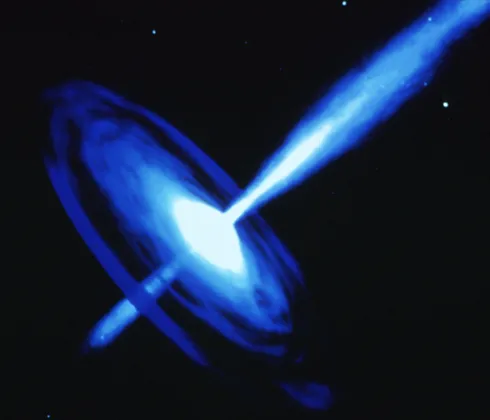
Artist's impression of the jets emerging from a supermassive black hole. Credit: Dana Berry/STScI
By Vandana Gupta
Two astronomers from the UK have discovered that the colossal black holes found in the centre of galaxies have been, on average, spinning faster than ever before in the history of the Universe.
These black holes have masses of up to a billion Suns and are therefore referred to as ‘supermassive’. Although these cannot be seen directly, radiation given off by material that swirls around the black hole before its final demise can.
This includes X-rays, which can be detected by space-based telescopes, and radio emissions, picked up by telescopes on the ground.
Dr Alejo Martinez-Sansigre from the University of Portsmouth and Professor Steve Rawlings of the University of Oxford came to the conclusion with the help of radio, optical and X-ray observations.
Using radio observations, the astronomers worked out the power of the jets, and by estimating how they draw material in – a process called accretion – they got an idea of how quickly these objects were spinning.
The results give information on how the spins of supermassive black holes have evolved.
In the past, when the Universe was half its current size, practically all supermassive black holes had very low spins.
But now, a number of them have very high spins. So on average, supermassive black holes are spinning faster than ever before.
Martinez-Sansigre and Rawlings suggest supermassive black holes that grow by swallowing matter will barely spin, while it is the ones that merge with other black holes that will spin rapidly.
